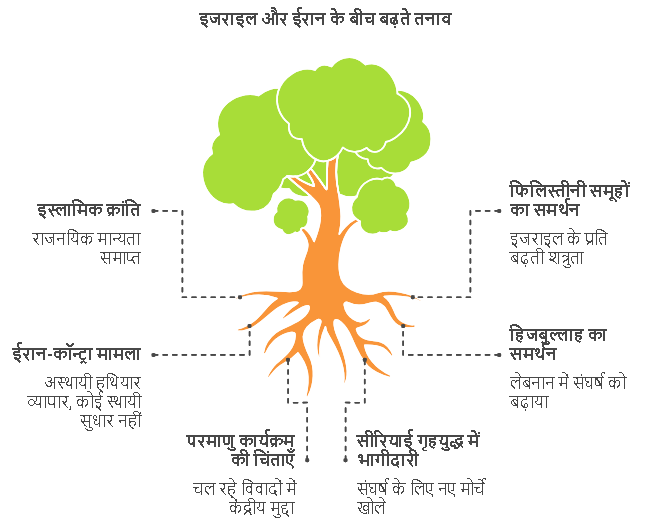Conflict of Socialism and Capitalism
Conflict of Socialism and Capitalism
In the last article, we tried to see the conflict between Israel and Iran (old name Persia) from an economic and geopolitical point of view, but there was unrest in the mind because as we know, without peace and socialism in the world, words like economy and economics coined by capitalism seem meaningless, but the need of the hour is that if we have to deeply understand the idea of words like economy and economics of capitalism, then we will also have to understand issues like socialism and global peace. So can we consider the Iran-Israel conflict as a context of capitalism and socialism?

Table of Contents
Under the shade of sociality,
We weave dreams,
We walk together on the path of equality.
In the dazzle of capitalism,
There is a wave of looting,
But with the hard work of workers,
A new world blossoms.
Before 1979, Israel and Iran (which are about 1500 km apart) had friendly relations. Both countries used to trade and had good relations with each other, but the Islamic Revolution of Iran changed everything.
The new Iran under Khomeini stopped recognizing Israel, which increased the tension between the two countries. Iran supported Palestinian organizations, while Israel expressed concern over Iran’s nuclear program.
In the 1980s, during the Iran-Iraq war, there was a strange turn. Israel secretly sold arms to Iran, which is known as the ‘Iran-Contra’ affair. But this was a practical and business deal, it did not improve relations. In the 1990s, tensions increased further. Iran supported Hezbollah, which was Israel’s opponent in Lebanon. Israel did not deny having a hand in the murders of Iranian scientists.
After 2000, Iran’s nuclear program became the main issue.
The civil war in Syria opened a new front. Iran supported Bashar al-Assad, while Israel attacked Iranian bases.
This conflict continued at many levels:
Nuclear program of Iran and Israel (Iran wants to make it while Israel is nuclear-capable)
Regional dominance for U.S.A. and Russia (America and Russia think of increasing their dominance, while this thinking has broken Russia)
Military confrontation (Iran’s support to Hezbollah, Hamas, Houthi and Palestinian organizations, Israel’s refusal to give Palestine their land, this issue has been a dispute for centuries)
Cyber war, Israel’s intelligence agency “Mossad” assassinates scientists and cyber attacks on research facilities to slow down Iran’s nuclear programs
Proxy conflict (or it can be considered that the result of the cold war between Russia and America)

Cultural and religious differences between Iran and Israel
Iran is an Islamic republic and its religious ideology is based on Shia Islam. On the other hand, Israel is a Jewish state. These religious differences have fueled political and cultural disputes. Iran believes that Jerusalem is a holy place for Muslims and Palestinians should get their rights back, while Israel considers it an integral part of Judaism
Newly formed alliance from Israel
Traditionally, relations between Israel and Arab countries have been tense, but recently countries like Saudi Arabia, UAE and Bahrain have established diplomatic relations with Israel. These relations have been formed through the Abraham Accords mediated by the US. Its purpose is to strengthen the regional power balance against Iran.
Role of America in contradiction of Israel and Iran
America and Israel’s friendly countries: America is Israel’s most important ally, which provides military assistance and diplomatic support to it. America is Israel’s major ally, which provides military cooperation and intelligence. Its purpose is to limit Iran’s influence in the region and criticize Iran’s aggressive activities.
Role of Russia between Iran and Israel Contradiction
Russia and Iran’s friendly countries maintain military cooperation with Iran, especially in Syria, where both countries support President Bashar al-Assad. But Russia also maintains a special relationship with Israel, especially by ignoring Israeli air strikes in Syria. This has given Russia a balanced effort to maintain its influence in the region. Iran supports organizations like Hamas and Hezbollah and has an alliance with Russia and Syria.
Economic Reasons of contradiction
Sanctions on Iran and their consequences
Various international sanctions have been imposed on Iran, especially regarding nuclear programs. The US has imposed many sanctions, which have had a negative impact on Iran’s economy. Decreased oil exports and lack of international investment have weakened Iran’s economic position.
Economic growth of Israel
On the other hand, Israel’s economy is based on technology and defense industries. It has a high level of advancement in cyber security and military technology, which gives Israel an edge against its enemies. Israel’s strong position in these areas has made it an important economic power in the region.
Possible obstacles to the agreement
The biggest obstacle in the way of peace efforts is the mutual distrust of the two countries and their ambitions of regional dominance. Apart from this, religious and cultural differences make this conflict more complex.
After all this, only one thought comes to mind
Why is the condition of countries and organizations called global peace ambassadors so bad?
In the end
Every hand should have rights,
Every heart should have faith,
Socialism and capitalism,
Let a new feeling be created.
Our struggle is endless,
A new story at every step,
In this stream of equality,
A new direction will flow
Image Credit to:-https://app.napkin.ai/
What is the Iran Israel war about?
To gain power and influence with other countries and groups in the Middle East, collectively named the “Axis of Resistance”. The conflict evolved with Israeli attempts to stop the Iranian nuclear program and confrontations during the Syrian civil war.
Why Israel and Iran are enemies? or why Israel and Iran at war?
After the 1979 Islamic Revolution, Iran severed all diplomatic and commercial ties with Israel, and its theocratic government does not recognize the legitimacy of Israel as a state.
Why Israel and Iran war started?
Israel had vowed to hit back after Iran carried out a ballistic missile attack on Israel on 1 October. In that attack, Iran fired more than 180 missiles at Israel. Most were intercepted by Israel’s air defences and US-led allied forces. Some though hit air bases and other sites. One Palestinian was killed by a falling missile casing.
Israel said it would retaliate, but did not say when or how. There had been constant speculation since then on the timing of an Israeli attack and what form it might take – from limited strikes to massive attacks on Iran’s oil fields and nuclear sites.
The attack came in the early hours of Saturday and appears to have been restricted to missile manufacturing and launching sites, and what Israel called “other aerial capabilities”, without being specific.
Why did Iran previously attack Israel and what was Israel’s response?
Iran said it attacked Israel on 1 October in retaliation for the killings of the leaders of Hezbollah and Hamas – Iranian-backed armed groups fighting Israel – and a senior Iranian commander.
Hezbollah leader Hassan Nasrallah and Brig Gen Abbas Nilforoushan were killed when Israel bombed the building they were in in the Lebanese capital, Beirut, on 27 September. Hamas political chief Ismail Haniyeh was killed in an explosion in the compound where he was staying on a visit to Tehran on 31 July. Iran blamed Israel for that attack, though Israel has neither confirmed nor denied involvement.
Iran’s attack was its second-ever directly against Israel. It came five months after it first attacked Israel with waves of about 300 drones and missiles. Israel said almost all were intercepted. That attack was in response to an Israeli air strike on an Iranian consulate complex in the Syrian capital, Damascus, on 1 April, which killed 13 people, including seven members of Iran’s overseas Quds Force. Two of those killed were a senior Quds Force commander and his deputy. Iran said the attack was a violation of its sovereignty.
The Quds Force is part of Iran’s most powerful armed force, the Islamic Revolutionary Guard Corps (IRGC).
The IRGC channels arms and equipment, including high precision missiles, through Syria to Hezbollah.
Israel retaliated for Iran’s missile and drone attack nearly three weeks later by attacking targets in Iran’s central Isfahan region. US officials confirmed the Israeli attack, though Israel did not comment. Israeli drones are reported to have hit radar for Iran’s Russian-made S-300 air defence missile system, which Israel believes would pose a particularly dangerous threat to any of its fighters planes in nearby air space.
The attack on the radar was considered limited and designed to signal Israel’s ability to strike Iranian military assets.
Iran vs Israel: Who has the bigger, better military, More powerful, More Strong?
In summary, while Iran has greater manpower and ground forces, Israel’s technological superiority and military spending provide it with a strategic advantage in modern warfare contexts.














Post Comment